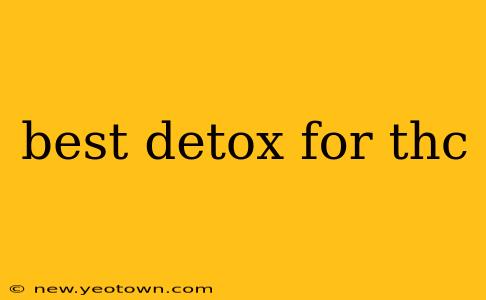The pungent aroma of cannabis lingers in the air, a testament to a night of relaxation or a carefree evening with friends. But what happens when that carefree feeling fades, and you face a drug test looming on the horizon? The question on everyone's mind is: what's the best detox for THC? There's no magic bullet, but understanding the process and available options can significantly improve your chances of passing a test. This isn't a guarantee, and it's crucial to remember that the effectiveness of any method depends on factors like your metabolism, how frequently you use THC, and the sensitivity of the test itself.
This journey isn't about a quick fix; it's about understanding how your body processes THC and employing strategies to expedite that process. Let's delve into the science and explore the various paths to a cleaner system.
How Long Does THC Stay in Your System?
This is a question that plagues many. The truth is, there's no single answer. The length of time THC remains detectable varies greatly depending on several factors:
- Frequency of Use: Chronic users will have higher concentrations of THC metabolites stored in fat cells, leading to longer detection times.
- Metabolism: Individual metabolic rates play a crucial role. A faster metabolism generally means quicker elimination.
- Body Fat Percentage: THC is fat-soluble, meaning it accumulates in fat tissue. Higher body fat percentages generally correlate with longer detection times.
- THC Potency: Higher potency products naturally contain more THC, resulting in higher concentrations in the body.
Generally, THC can be detectable in urine for a few days to a month or more, in hair follicles for up to 90 days, and in blood for a few days. This range underscores the complexity of detoxing and the importance of a comprehensive approach.
What are the Best Detox Methods for THC?
Let's address the elephant in the room – there’s no single “best” detox method universally effective. However, a combination of strategies usually yields the best results.
1. Hydration:
This is arguably the simplest and most effective starting point. Water helps flush THC metabolites from your system. Drinking plenty of water throughout the detox period is essential.
2. Healthy Diet:
A diet rich in fruits, vegetables, and whole grains supports liver function, which is crucial for metabolizing and eliminating toxins. Avoid processed foods, sugary drinks, and excessive fats.
3. Exercise:
Physical activity helps speed up your metabolism and promotes detoxification. Regular exercise is beneficial for overall health and can aid in the elimination of THC metabolites.
Can Detox Drinks or Pills Help?
Many detox products claim to accelerate THC elimination. While some might offer a temporary advantage, the scientific evidence supporting their long-term effectiveness is limited. Many of these products contain diuretics, which can lead to dehydration and other health issues. It's crucial to approach these products with caution and consult a healthcare professional before use.
What About Detox Teas?
Detox teas often contain herbal ingredients marketed for their cleansing properties. While certain herbs might offer some benefits for overall health, there's no strong scientific evidence to suggest they significantly impact THC elimination.
How Long Does a Detox Take?
The duration of a successful detox varies widely depending on individual factors mentioned earlier. A multi-pronged approach, combining hydration, diet, and exercise, is often the most effective strategy. It’s important to start well in advance of any potential testing.
The Bottom Line:
Finding the "best" detox for THC involves understanding the science behind THC metabolism and implementing a holistic approach. Hydration, a healthy diet, and regular exercise are the cornerstones of a successful detox. While commercial detox products might offer a temporary boost, they shouldn't be considered a guaranteed solution. Remember, the most reliable way to avoid a positive test is to abstain from cannabis. This information is for educational purposes only and should not be considered medical advice. Always consult a healthcare professional for any health concerns or before making any decisions related to your health or treatment.

